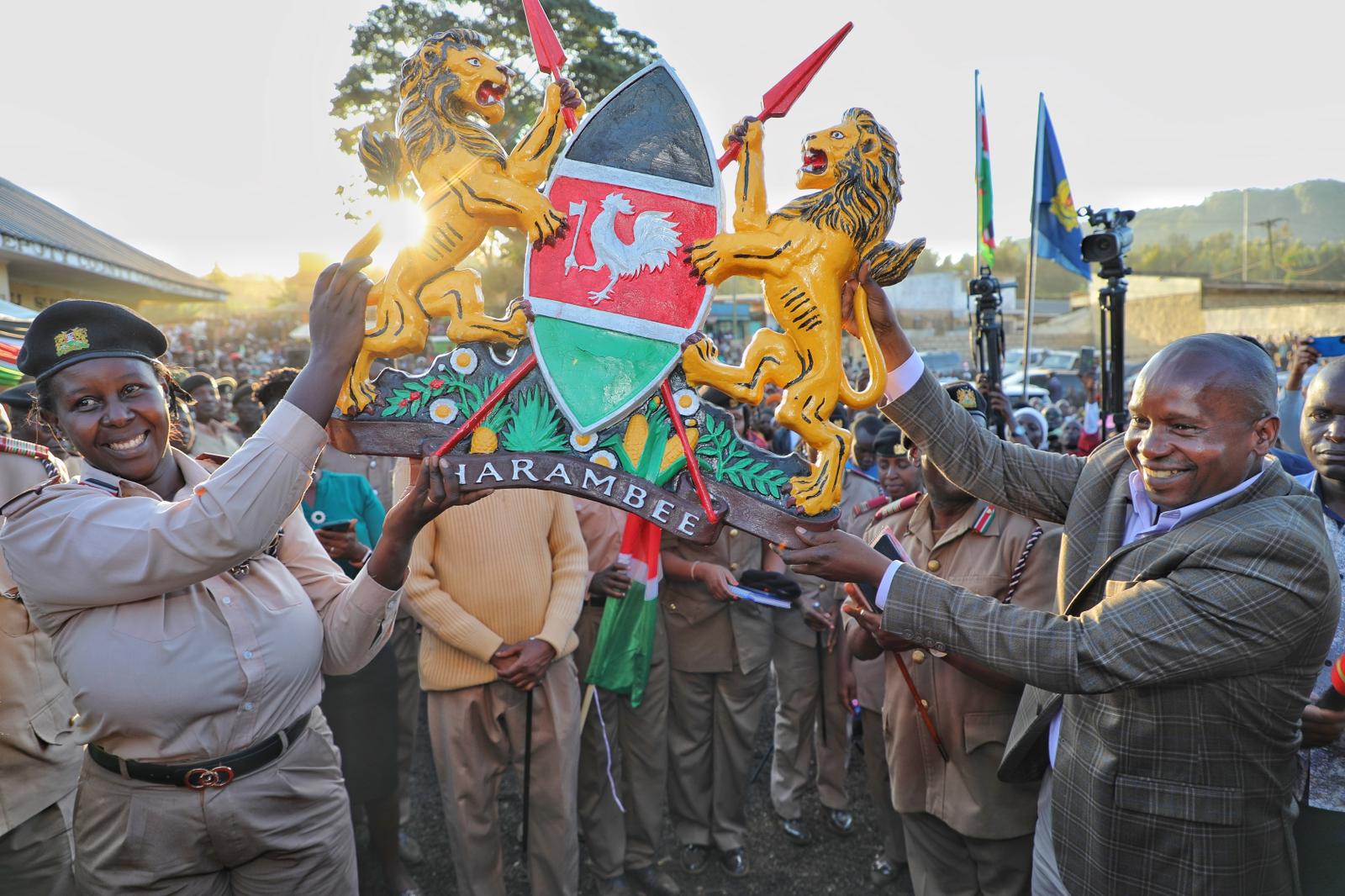Reorienting National Government Administration for the 21st Century
In Kenya, National Government Administrative Officers (NGAO) play a crucial role in driving development initiatives and ensuring the smooth functioning of government programs at the grassroots level.
These officers, including Chiefs and Assistant Chiefs, Sub County, County and Regional Commissioners are often the first point of contact between the government and the local community, making them instrumental in implementing government policies and programs.
NGAO officers play a multifaceted role in national development, ranging from maintaining law and order to spearheading development projects. They are key in delivering the government’s Bottom-Up Economic Agenda in the regions owing to their role in maintaining a credible national integrated information system, promoting national cohesion and facilitating the administration of justice at the community level.
Through various measures, including integration into the NGAO framework, involvement in decision-making processes, incentivization, and technological integration, the government has ensured that NGAO officers are active participants in all sectors.
This concerted effort, authorities say, not only strengthens the government's presence at the grassroots level but also enhances the effectiveness of its policies and programs.
For example, Chiefs participate in local administrative meetings where they provide insights and feedback on government policies and programs.
The chief office draws the authority from the Chiefs’ Act 1998; revised edition 2012 as read with National Government Co-ordination Act, 2013.
A report by the National Crime Research Centre (NCRC) highlights, ‘Kenya's chiefs offer a unique lens for exploring ways of public administration and execution of government policies.’
“It also emerged that the majority of the members of the public believe that the chiefs/assistant chiefs are efficient and effective in-service delivery. Many community members also expressed that chiefs treat people with fairness in carrying out their duties and they also meet expectations of the locals in crime and security management,” reads the report.
Establishment of New Administrative Units
On February 14, 2024, the Cabinet Secretary for Interior and National Administration, Prof. Kithure Kindiki invoked the powers conferred by section 14 (1) of the National Government Coordination Act, 2013, to create 31 new Administrative Units aimed at enhancing service delivery co-ordination.
CS Kindiki reiterated the government's commitment to establishing more administrative units to bring services closer to the people and improve security, public order and law enforcement. This expansion is intended to create a conducive environment for socio economic development across the country.
Speaking during the launch of the newly established Eldas South sub-county in Wajir County, CS Kindiki noted, "The creation of new administrative units is a significant boost in the fight against terrorism and violent extremism in Northern Kenya."
While operationalizing sub-counties in Lamu and Wajir, CS Kindiki urged citizens to work with the security officers and resist attempts by terror groups to radicalize the youth into violent extremism.
Digitization of Administration and Field Services
According to PS Dr. Omollo, NGAO officers play a pivotal role in disseminating information, implementing government policies, and resolving disputes within their jurisdictions.
He said they are, “the fulcrum upon which the lever of national administration swings to meet and work for the people at the grassroots.”
So far, the PS has led a number of initiatives to promote the welfare and capacity of chiefs and their assistants.
For instance, the State Department for Internal Security and National Administration has introduced ‘Project BETA’, a digital reporting and monitoring tool.
The tool helps evaluate and track the implementation, progress and performance of National Government Development Projects, priority programmes; Presidential directives and crime statistics in the country through NGAO.
The tool relays information in real-time and government programmes will from now on be marked by timeliness and instant retrievability.
Improving Mobility
As part of our security modernization programme, we have launched a pilot project for electric motorcycles in Machakos, Kiambu, Nairobi, and Kajiado Counties, distributing 22 motorcycles to Chiefs.
During the launch of the first batch of these electric motorcycles, PS Dr. Omollo highlighted the dual benefits of this effort in improving mobility of National Government Administrative Officers and combating climate change.
“Chiefs will play a key role in encouraging communities at the grassroots level to adopt sustainable technologies”, Dr. Omollo noted.
The initiative is part of the Government’s official Transport Leasing Programme that seeks to promote electric vehicle adoption, in line with the BETA agenda. The programme focuses on reducing vehicle operating costs while significantly improving the operational efficiency of Administrative Officers, the National Police and the Correctional Service.
The introduction of electric motorcycles provides a reliable and efficient means of transport, enabling officers to perform their duties more effectively, respond swiftly to incidents, and enhance overall public service delivery. It directly addresses ongoing transportation challenges amidst increasing demands for surveillance and security patrols.
Adapting to Climate Change
The security sector finds itself at a critical juncture in the development and implementation of comprehensive adaptation strategies that enhance resilience to climate impacts and protect vulnerable communities.
Increasingly, we are witnessing security-related challenges driven by dwindling resources, such as water and arable land, leading to competition, disputes, conflicts, social instability, regional tensions, and even violence.
Adverse climatic conditions such as drought, famine and floods pose serious threats to food security, water, and human settlement. We are now seeing more populations being compelled to migrate in search of basic resources and better livelihoods, placing immense strain on host communities.
President William Ruto, recognizing the urgent climate risks and the compounding threats future generations will face, has championed an ambitious ecological initiative to plant 15 billion trees by 2032. Locations, led by Chiefs, are being turned to be the focal points of coordinating the distribution of seedlings and mobilizing residents in their localities to actively participate in tree growing activities.
“On every National Tree Growing Day, we encourage the public to visit their nearest Chief’s Office to acquire tree seedlings”, said PS Raymond Omollo, accompanied by area National Administration Officers, during the November 13 National Tree Growing Day at Hula Hula forest in Marsabit County.
Recognizing Village Elders
Village elders have long been a cornerstone of grassroots governance in Kenya.
Known as headmen or wazee wa mtaa, these leaders are chosen based on their deep ties to the community, knowledge of its members, familiarity with the area, integrity, and extensive experience. Despite their integral role in facilitating service delivery and supporting the National Government at the village level, they have traditionally worked as volunteers without compensation.
Addressing the Senate Standing Committee on National Security, Defence, and Foreign Relations, Cabinet Secretary Kithure Kindiki stated that the Kenya Kwanza Administration acknowledges the critical services provided by village elders and emphasized the need for their support through formal recognition and remuneration.
With 106,072 villages across the country, the Ministry of Interior and National Administration has drafted a legislative proposal to amend the National Government Coordination Act of 2013 to officially recognize village elders in each unit.
The National Government Village Administration Policy proposes a phased implementation of a monthly allowance of up to Ksh. 7,000 for all village elders, starting with a stipend of Ksh. 2,000 per month. This is tied to Kenya's economic conditions and is commensurate to the disbursement given to elders in the Inua Jamii Programme.
Public Communication Division
Ministry of Interior and National Administration




